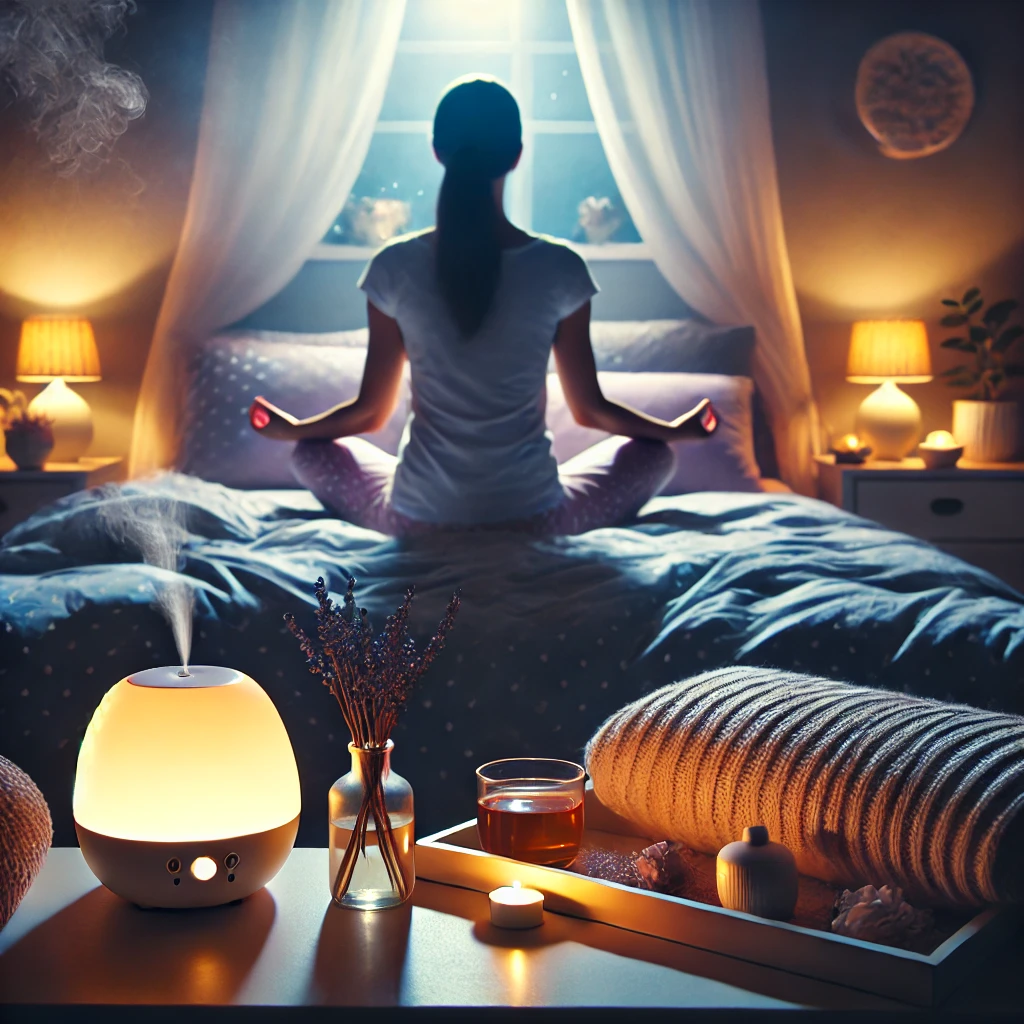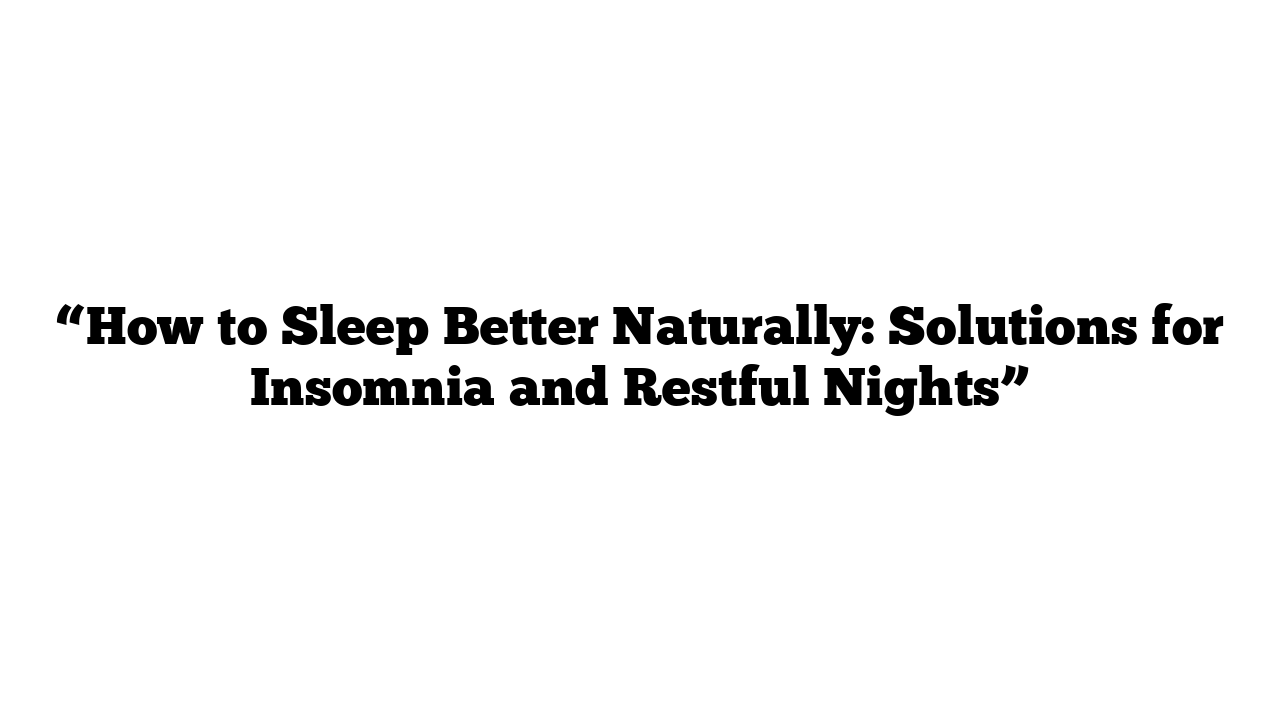Struggling to fall asleep can be frustrating and impact your health in the long run. Whether it’s late-night thoughts keeping you awake, or the temptation to reach for sleep aids, the road to restful nights is easier than you might think.
This article explores how to overcome sleeping disorders, how to sleep without medications, and the role of lifestyle, diet, and mindfulness in achieving better sleep.

Part 1: Understanding the Problem and the Natural Approach
Why Can’t You Sleep?
Sleep disorders are more common than many realize, especially in countries like the USA, where stress, technology, and busy lifestyles disrupt natural sleep cycles. Common issues include:
- Stress and anxiety leading to overthinking at night.
- Exposure to screens late at night, disrupting melatonin levels.
- Poor sleep environments like too much noise, light, or uncomfortable bedding.
- Irregular sleep patterns due to work or social commitments.
“Sleep is the golden chain that ties health and our bodies together,” said Thomas Dekker. If this chain feels broken, understanding the root cause is your first step to fixing it.
How to Avoid Late-Night Awakeness
Staying up late may feel productive, but it can wreak havoc on your health. To avoid sleepless nights:
- Limit Screen Time Before Bed
Blue light from phones and computers reduces melatonin, the sleep hormone. Switch off screens at least one hour before sleeping. - Set a Sleep Schedule
Go to bed and wake up at the same time daily, even on weekends. Consistency helps regulate your internal clock. - Create a Sleep Sanctuary
Keep your bedroom quiet, dark, and cool. Invest in blackout curtains and quality bedding. - Avoid Caffeine and Heavy Meals at Night
Coffee, soda, and rich foods stimulate your body, making it harder to wind down.
How to Sleep Properly Without Medicine
Medications may provide temporary relief, but natural approaches are safer and healthier for long-term sleep solutions.
- Develop a Relaxing Bedtime Routine
Engage in calming activities such as reading, listening to soft music, or practicing yoga stretches. - Use Aromatherapy
Essential oils like lavender and chamomile can signal your brain it’s time to rest. A diffuser by your bed can do wonders. - Progressive Muscle Relaxation
Tense and release each muscle group, starting from your toes to your head. This technique eases tension and promotes sleep.
The Role of Meditation in Sleep
Mindfulness meditation is a proven tool for better sleep. By calming the mind, it can reduce racing thoughts and prepare the body for rest. Here’s how to start:
- Find a Quiet Space: Sit or lie down comfortably.
- Focus on Your Breathing: Breathe deeply and slowly.
- Visualize Calmness: Picture peaceful settings like a beach or forest.
Meditation apps like Calm and Headspace offer guided sleep meditations tailored for beginners.
Part 2: Solutions, Diet, and When to Seek Help
Best Ways to Sleep Better
Building the right habits can make a big difference. Here’s a checklist for optimizing your sleep:
- Daily Exercise
Physical activity helps burn off energy and reduce stress. Aim for at least 30 minutes, but avoid intense workouts close to bedtime. - Natural Light Exposure
Spending time outdoors, especially in the morning, regulates your body’s circadian rhythm. - Hydration
Stay hydrated throughout the day but limit fluids a few hours before bed to avoid waking up for bathroom trips.
Fruits and Diet for Better Sleep
Your diet plays a vital role in sleep quality. Incorporate these foods:
- Bananas: High in magnesium and potassium, they relax muscles.
- Almonds: A natural source of melatonin.
- Cherries: Help boost melatonin levels.
- Herbal Teas: Chamomile and valerian root tea can be calming.
Avoid sugary snacks and alcohol, as they can interfere with sleep cycles.
How to Avoid Medicine in Sleep Management
Resisting the temptation to use medication is important for long-term health. Instead, rely on these strategies:
- Stick to a wind-down routine to signal your body it’s time to rest.
- Journal Before Bed to release thoughts or worries that keep you awake.
- Use weighted blankets, which provide gentle pressure to reduce anxiety.
When to Consult a Doctor
If sleep issues persist despite trying these methods, consult a healthcare professional. Conditions like sleep apnea or severe insomnia may require specialized treatment. Reach out to local resources or visit “medicaltimes.io” for guidance on finding help.
A Brighter Morning Ahead
Good sleep is within reach, and it starts with making small changes. Whether it’s turning off screens, enjoying a cup of chamomile tea, or meditating before bed, every step counts. By prioritizing sleep, you invest in your overall health and well-being.
Reference Website:
Top 10 Frequently Asked Questions (FAQs)
- What is the best sleeping position for good rest?
Sleeping on your back with a pillow under your knees is ideal for spine alignment and better sleep. - Can I overcome insomnia naturally?
Yes, by maintaining a consistent routine, practicing relaxation techniques, and optimizing your sleep environment. - Does diet affect sleep?
Absolutely! Foods rich in magnesium, potassium, and melatonin improve sleep quality. - How long should I meditate for sleep?
Start with 5–10 minutes and gradually increase as you become comfortable. - Is screen time the only reason for poor sleep?
No, stress, diet, and poor habits also contribute to sleep issues. - What are the top teas for better sleep?
Chamomile, valerian root, and passionflower tea are excellent options. - Can regular exercise cure insomnia?
Exercise significantly improves sleep quality, but avoid vigorous workouts before bed. - What fruits help you sleep better?
Bananas, cherries, and kiwis are great choices for better sleep. - Is it safe to stop sleeping pills abruptly?
Consult your doctor before stopping any medication to avoid withdrawal effects. - How soon can lifestyle changes improve sleep?
Many people notice better sleep within a few weeks of consistent changes.
Reference Website:
Natural Sleep Aids: Home Remedies to Help You Sleep
Can’t Sleep? 8 Techniques You Can Do
Top 15 Proven Tips to Sleep Better at Night
How to Fall Asleep Without a Sleep Aid
8 secrets to a good night’s sleep – Harvard Health
21 ways to fall asleep quickly and naturally
How to sleep better at night naturally (no medication needed)
